
Altit Fort: A Timeless Sentinel of Hunza Valley
May 14, 2025
Monsoon Travel in Northern Pakistan: Risks and Precautions
August 13, 2025For centuries the remote Kalash community of Pakistan has welcomed late summer with a grand Kalash Festival of harvest and gratitude. Uchal (also spelled Ushawal or Yashawaar) is the Kalash “Thanksgiving” festival, a vibrant celebration of the barley and wheat harvest. During Uchal, families give thanks for “good food and abundant crops” by holding communal feasts, music and dance in the foothills of the Hindu Kush. The festival is woven into Kalash identity as one of their most significant cultural celebrations. Indeed, UNESCO has recognized the Kalash summer festivals (including Uchal) as intangible cultural heritage, highlighting their unique heritage in the Chitral valleys. Each August, Uchal brings together the three Kalash valleys (Bumburet, Rumbur and Birir) in a burst of color, song and solemn ritual.
In Uchal’s early days, villagers rise before dawn to bless the crops. Women in embroidered woolen dresses gather ears of corn and other grains in large baskets, a symbolic offering of the harvest. The image above shows Kalash women standing in a lush valley with baskets of corn – a scene straight from Uchal’s harvest rituals. Such scenes define the festival’s spirit: a community united in gratitude, with young and old participating in simple rural rites. Kalash Festival traditions emphasize giving thanks to nature and the Creator for blessings of plenty. Every song sung and offering made is a gesture of communal harmony and celebration of the land.
Dance and Drumming Traditions
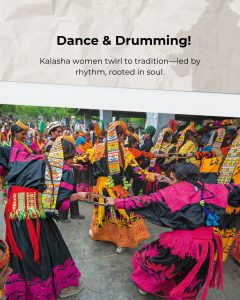
When the morning prayers conclude, Uchal erupts into a dynamic display of dance. Both men and women don their finest dresses – the women’s distinctive black dresses with colorful embroidery, beadwork and cowrie-shells, and the men’s embroidered wool coats and tall caps – and line up in open courtyards and fields. Flutes and drums set the rhythm, and soon the entire community is dancing in a swirl of motion. The Kalash music tradition relies on two characteristic drums: a small hourglass-shaped wãc and a larger bass dãu. Dancers move in concentric circles to the drumbeats, twirling with arms raised and anklets jingling. As one tour guide noted, “women dressed in traditional attire perform dances” and the beating of drums fills the air. These joyous dances are both a folk performance and an act of thanksgiving – every step and clap of hands is an expression of gratitude. Visitors at Uchal often find themselves swept into the dance, as Kalasha hosts welcome guests to join the circle of celebration.
The Sacred Procession to Balangkuru
A defining moment of Uchal is the sacred procession to the Balanguru plateau. In the late afternoon or early evening, villagers and priests make a pilgrimage to a high grassy plateau above the village. Carrying noisemakers, wine vessels and sometimes sacrificial offerings, they ascend along narrow mountain paths toward Balanguru – a site deeply important in Kalash mythology. Upon reaching the plateau, elders lead prayers to the Creator and the gods of fertility and nature. The scene is reverent yet vibrant: traditional drums echo through the pass, and after the brief ritual ends, the sky over Balanguru lights up with bonfires. Kalash men and women dance around the fire deep into the night, their faces illuminated by flickering flames. In this panoramic view above, one can imagine the devotees winding up through terraced fields toward the mountain shrine. The long night of dancing here is a key highlight of the festival, uniting all in communal joy.
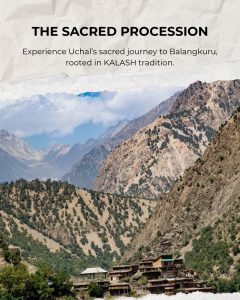
Tastes and Traditions
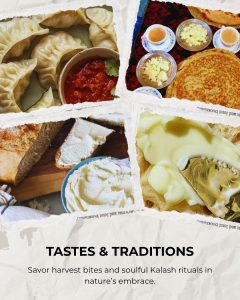
No harvest festival is complete without feasting, and Uchal is a culinary celebration of the valley’s bounty. The Kalash people prepare an array of traditional foods from the season’s harvest. Corn is central: families grind it into flour for soft cornbread, and it is boiled or roasted for savory dishes. Rich dairy items are everywhere – butter tea and yogurt-like buttermilk are sipped alongside slabs of phonay (cream butter), and creamy cheese wheels are cut into wedges for guests. The image above shows some of these specialties – from golden cornbread and creamy cheese to bread slathered with butter – all symbolic of the abundance of the fields. Local walnuts are also prized: Kalasha kitchens bubble with walnut-infused tea and bread, a unique tradition of the valley. At communal feasts, villagers share bowls of everse (a sweet cornbread) or chunks of khwoi (walnut bread) while toasting one another’s health. These foods are not merely fuel; they are ritual offerings to the gods and the earth, and eating them together renews the bonds of community.
Life in Kalash Villages
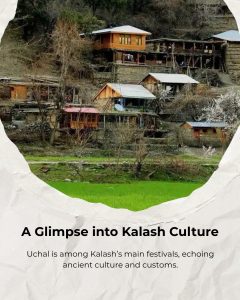
Beyond the festival grounds, the Kalash villages themselves are living museums of culture. Nestled high on steep hillsides, the wood-and-stone houses of Birir, Bumburet and Rumbur are built tier above tier – each home’s roof often forming the courtyard of the house above. The buildings, with whitewashed walls and dark wooden roofs, cluster against the lush mountain backdrop. Inside, life is communal and traditional. Men tend the fields of wheat, barley and grapes (much of which will feed into wine and whiskey for celebration), while women spin wool into shu fabric and sew the elaborate embroidery that adorns their clothing. Children run barefoot through walnut orchards and apricot groves, and village elders (known as Qazi) ensure that customs and stories pass to each new generation. The children laugh and play even during the festival, darting between adults as loud drumming resounds. In the image above, a cluster of Kalash homes perches on a terraced slope – a typical scene outside festival time. Even daily life carries a ritual quality: for example, girls may stay in a special bashaleni hut during puberty, and weddings are announced with horse sacrifices and feasting. This abiding respect for tradition and nature permeates every aspect of village life, from architecture to attire and daily routines, giving the Uchal Festival its richly authentic backdrop.
When & Where: Event Dates and Booking Info
In 2025, Uchal Festival celebrations are scheduled for August 20–22. Visitors should arrive in Chitral before August 20 to join the processions and dances in the three Kalash valleys. The stunning image above reminds travelers of the event dates against the backdrop of the green Chitral landscape. The Kalash villages are accessible by road from Chitral town (via Lowari Tunnel), and accommodations range from simple guesthouses in the valleys to hotels in Chitral. MyTrip.pk is organizing special tour packages for Uchal 2025; these include guided transportation, translators, and lodging arranged with local hosts.
Key Event Details:
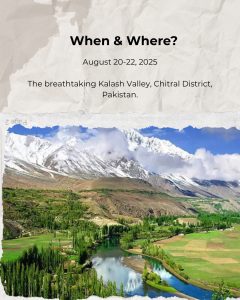
- Dates: August 20–22, 2025
- Location: Kalash Valleys of Bumburet, Rumbur and Birir (Chitral District)
- Booking: Private tour packages with MyTrip.pk for a hassle-free experience
Travelers are encouraged to book early through MyTrip.pk. The vibrant promotional poster above – emblazoned with the phrase “where culture comes alive” – reflects the immersive experience MyTrip provides. By coordinating with local guides and community leaders, MyTrip.pk ensures respectful and authentic encounters: guests can participate in workshops on Kalash handicrafts, sample regional cuisine, and even join circle dances on the festival grounds. To reserve your spot for Uchal 2025, visit the MyTrip.pk website or contact our travel desk (e.g. info@mytrip.pk or the number on our website). This is a rare opportunity to witness one of the world’s most unique cultural festivals.
Embark on this journey and become part of the Kalash Festival legacy – an unforgettable chapter in the story of Pakistan’s cultural heritage.
